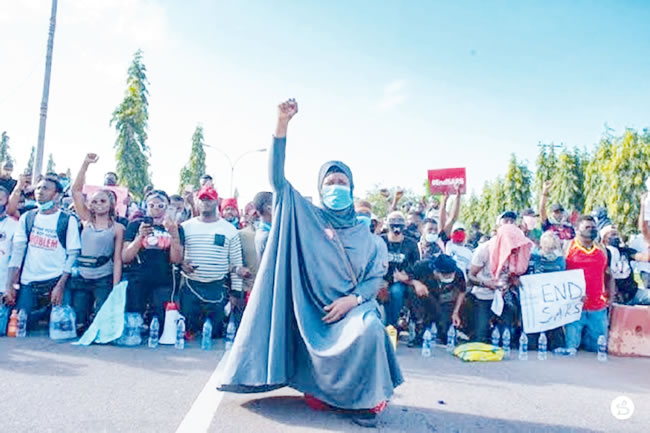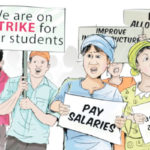LANRE ADEWOLE recalls a national tragedy sparked by a revolutionary candour.
Ndubuisi Udo, popularly known as “Dele” Udo, was a Nigerian sprinter and a collegiate champion at the University of Missouri in the United States of America in the 70s. Born on 24th May, 1957, the Umuahia-born quarter-miler competed at the 1980 Summer Olympics and the future was looking all wrapped-up, until he visited “home” in July 1981 and a check-point argument with a police officer, irretrievably cut his life, dreams and aspiration.
It was one extra-judicial murder by the Nigerian Police that sent shock waves across the country, reverberating world over, despite the limited information technology of the time. He was one of the early numbers of police brutality in Nigeria, which peaked with the coming of the Special Anti-Robbery Squad (SARS), one of the 14 units in the Force Criminal Investigation and Intelligence Department (FCID), in November 1992, to “detain, investigate and prosecute violent crimes, armed robbery and kidnapping”.
By the time SARS was dissolved on October 11, 2020, the alleged violent crimes of the officers of the unit against humanity and innocent Nigerians had almost thrown the country into widespread lawlessness as Nigerians, particularly the youth, took over the social media and its near-limitless capacity for information dissemination and expansion and later the streets, to protest against the numerous atrocities of the SARS officers and the perceived lethargy of the central government to rein in the brutality and extortion, that had come to define the special squad.
Despite the raging coronavirus pandemic, Nigerians in near unanimity, strongly backed by the international community, raged against the system, the operators and their employer, the Federal Government of President Muhammadu Buhari and while the initial official reactions seemed to be that of seeking a compromise, culminating in the sacking of SARS and formation of SWAT as its successor, Nigerian youth seemed not to be in a hurry for a closure, setting the stage for a 17-day protest that shook the country to its foundation.
The outgoing 2020 may be the year of #EndSARS with the campaign raking in about 28 million tweets on twitter alone, but the campaign actually started in 2017. Though mainly limited to online campaigns, protest against police and military brutality got to a head, with Nigerians of different hues, speaking out and against the system. The reform promises made by Abuja, also appeared to be of no moment as the report of the presidential panel indicting SARS officers in 2018, following the 2017 protest, was never implemented.
37 officers for dismissal, 24 for trial
The very day the Inspector General of Police, Mohammed Adamu was demolishing SARS on October 11, in the heat of the brewing volcano of a protest, leading rights activist and senior advocate of Nigeria, Mr. Femi Falana was reminding the police authorities and the central government of the hidden report which was allegedly gathering dust away on the shelf of the President.
Hear him, “Following public outcry in 2018 against the indiscriminate arrests and detention, extortion and extrajudicial killings as well as other horrendous human rights abuse of the Nigerian people perpetrated by the operatives of the SARS, the Federal Government responded by setting up a Presidential Panel of Enquiry to investigate all complaints of human rights abuse.
“ It is on record that many Nigerians submitted reports and memoranda and gave clear evidence of police abuse. But that the Federal Government has not implemented the recommendations of the Panel after two years of the submission of its report. Some of the recommendations of the panel are, dismissal of 37 police officers from the force and the prosecution of 24 others, investigation of 22 officers involved in the violation of human rights of innocent citizens, payment of compensation of various sums in 45 complaints and tender of public apologies in five complaints and compliance with court orders in five matters and the renaming of SARS to Anti-Robbery Section (ARS), which was its original name, and to make the section operate under the intelligence arm of the police.”
He added, “On June 3, 2019, the President directed the Inspector-General of Police and the Solicitor-General of the Federation/Permanent Secretary, Federal Ministry of Justice to liaise with the National Human Rights Commission “to work out the modalities for the implementation of the report within 3 months.”
For the under-fire top cop. IGP Mohammed Adamu, Falana also had a word, “The 1999 Constitution, the Administration of Criminal Justice Act, 2015, the Anti Torture Act, 2017 and the Police Act, 2020 have imposed a duty on the Nigeria Police Force to respect the fundamental rights of the Nigerian people.”
Nicholas’ lens of history
Until the early days of October, Nicholas Makolomi, a local videographer in Ughelli, Delta State was only known to his immediate environment and possibly, customers. But his decision to shoot a viral video of policemen killing one person, which set the internet on fire and re-ignited the EndSARS protest that later snowballed into a global conflagration, was a turning point in his professional life and the story of his ‘Nigerianness’. Apart from becoming a major subject of interest to the country’s security community, he has been in and out of detention, with the latest being his re-arrest on Monday, 14th December, 2020, by operatives of the Force Intelligence Bureau (FIB). According to his lawyer, Ekenemolise Osifo, Makolomi had earlier been arrested and arraigned in court by the police in Asaba, but granted bail by the trial court.
Osifo, his lawyer, alleged that the reason for the re-arrest of his client was because he had brought the attention of the police to an act of unlawful extortion conducted by a Superintendent of Police who requested the sum of N.5milliom to grant him soft-landing over his (Makolomi) lingering case with the police.
According to the lawyer, “As a cover up for their inadequacy or lack of discipline to investigate the extortion issue, the police cunningly withdrew the pending matter from the court and re-arrested him.”
A nation’s loss.
What started as peaceful protest in Lagos on October 8 alongside sit-out and even sleep-out in front of the government house, spreading like a wildfire across the country as the days went by, got to a regrettable curve on October 20. At 6.50pm, soldiers moved to the popular Lekki tollgate on the Island of the state where the protesting youth had camped and allegedly opened fire on them. While the central government has insisted no life was lost in the course of the shooting, eye-witnesses and international organisations have held on to the claim that lives were lost. With bodies yet to be seen as evidence of extra-judicial murder at the scene of the shooting, the ding-dong has continued between the administration of President Muhammadu Buhari and the rest of the world, while excitement is also practically dead for the judicial panels of inquiry set up by all the state governments as part of the official response to the widespread allegations of man-inhumanity-against-man, against the security community.
But while the contestations go on over the Lekki shooting, the country is counting verifiable losses and mourning its dead, lost to the widespread riots that greeted the Lekki shooting and nationwide looting.
The Federal Government official spokesperson and Minister of Information and Culture, Alhaji Lai Mohammed, had, at a press conference said, 57 civilians, 37 policemen and six soldiers were killed during the #EndSARS crisis, all over the country. He also said 196 policemen were injured; 164 police vehicles destroyed and 134 police stations were razed.
Villains as victims?
In a 2016 report of Amnesty International, SARS was indicted for human rights abuses, cruelty, torture, shooting, hanging, mock executions and threats of execution, with calls on the central government which supervises the police, for an immediate intervention, largely petering out without justifiable official remedy. In 2020, AI said SARS had 82 cases of abuses and extra-judicial killings between January 2017 and May 2018, while the report generated by the presidential panel, largely sat idle. The October crisis forced government back into action.
Since the street rioting simmered on October 22, police have been playing the victim, with officers staying away from public duties, like patrolling, responding to distress calls, traffic management and even the controversial roadblocks, that have earned the men-in-black, infamy.
State governments have also been pandering to the institution, promising mouth-watering compensation to families of deceased officers, while the various judicial panels are expected to determine the compensating due to surviving victims and families of dead victims of SARS’ brutality. While the public is grumbling away the perceived double-standard, the Federal Government has stayed with the narrative of police being victim of EndSARS’ protest.
Mohammed said the Federal Government was satisfied with the role played by the security agencies, all through the crisis, adding they were professional and measured in their response.
The minister also said it was depressing and demoralising to continue to vilify men and women in uniform, who themselves were victims of violence unleashed by hoodlums, stating that government would not accept a situation in which some human rights bodies and media organisations would continue to harass the security agencies over their roles during the crisis.
While the “protest” has not been completely abandoned, police leadership has also empowered them, to henceforth, use arms in self-defence, a call from Adamu, many have tagged irresponsible. The charge from the police boss is believed to be setting the stage for future crisis between the civil populace and the police, while the mess of ‘soro soke’ in 2020 is yet to be cleaned up. As 2021 approaches, regardless of the divide, nearly everyone agrees something has shifted in the psyche of the country. Only time will tell, what exactly is it!
YOU SHOULD NOT MISS THESE HEADLINES FROM NIGERIAN TRIBUNE
COVID-19: Nigeria Recorded 5,178 New Infections Last Week
Nigeria has officially entered a second wave of the COVID-19 pandemic, according to the announcement made by the Presidential Taskforce on COVID-19. This is as confirmed cases in the country have increased astronomically weekly, Tribune Online analysis shows.
A close ally of President Donald Trump and the United States Attorney General, William Barr, has resigned his appointment after holding a meeting with the president…
Bandits Moved Abducted 333 School Boys On Bikes —DHQ
THE Nigerian Army, on Monday, gave more insight into the abduction of school children in Kankara Local Government Area of Katsina State…






